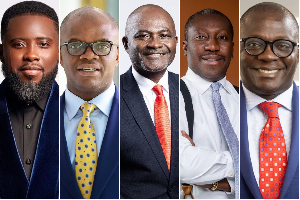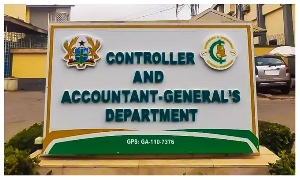On Sunday the 7th of January 2018, the country celebrated the 25th Anniversary of the 4th Republic. The success of the 4th Republic has invariably been hinged on the 1992 Constitution – a document bastardized at birth, but yet remains the longest-serving constitution in the 60-year post-independence history of Ghana. That notwithstanding, the 1992 Constitution has also, in its implementation, thrown out some challenging provisions that have required interpretation by the Supreme Court. One of such provisions is Article 60 (11) of the 1992 Constitution. Article 60(11) and Article 60(12) of the 1992 Constitution provide as follows:
• Where the President and the Vice-President are both unable to perform the functions of the President, the Speaker of Parliament shall perform those functions until the President or the Vice-President is able to perform those functions or a new President assumes office, as the case may be.
• The Speaker shall, before commencing to perform the functions of the President under clause (11) of this article, take and subscribe the oath set out in relation to the office of President.
This article takes a critical look at this provision and its implementation and posits that the current interpretation of the Supreme Court is, respectfully, problematic; and places an unnecessary clog on our constitutional development.
There are clear grounds for the invocation of the jurisdiction of the Supreme Court in matters of constitutional interpretation. In the case of Republic v Special Tribunal; Ex parte Akosah [1980] GLR 592, the Court of Appeal at page 605 identified the following as the grounds upon which the jurisdiction of the Supreme Court to interpret a provision of the Constitution may be invoked:
1. Where the words of the provision are imprecise or unclear or ambiguous. Put in another way, it arises if one party invites the court to declare that the words of the article have a double meaning or are obscure or else mean something different from or more than what they say.
2. Where rival meanings have been placed by the litigants on the words of any provisions of the Constitution.
3. Where there is a conflict in the meaning and effect of two or more articles of the Constitution, and the question is raised as to which provision should prevail;
4. Where on the face of the provisions, there is a conflict between the operation of particular institutions set up under the Constitution and thereby raising problems of enforcement and of interpretation.
It is on the back of these grounds that the Supreme Court was invited to look at the meaning of the provisions in Article 60 (11) of the 1992 Constitution in the case of Asare v. Attorney General [2003-2004] SCGLR.
The Supreme Court in Asare v. Attorney General reasoned that “unable to perform the functions of the President” connotes a situation where the President and the Vice President are both outside the country. The Supreme Court speaking through Professor Kludze JSC stated that “…the basic assumption of article 60(11) is the idea that the executive power of the presidency should never be in abeyance.”
The Court further stated: “…to have a situation when there is no person in Ghana to exercise the executive power of the presidency would be a prescription for chaos and anarchy, and could expose this nation to both internal and external instability”
It is for this reason that whenever the President and the Vice President are out of the jurisdiction even for just a few hours, Parliament is convened to swear in the Speaker of Parliament as Acting President.
This practice raises a number of issues particularly in the 21st century and in the era of technology.
First, a close look at Article 60 will reveal that the framers of the Constitution never intended the word “unable” to mean being outside of the jurisdiction.
Article 60(8) 0f the 1992 Constitution. That provision provides that:
“Whenever the President is absent from Ghana or is for any other reason unable to perform the functions of his office, the Vice-President shall perform the functions of the President until the President returns or is able to perform his functions.”
It is in the provision that the Constitution mentions “absent from Ghana”. When this provision is compared to Article 60 (11), it becomes evident that the ONLY time the speaker can be sworn-in as Acting President is when the “Both President and Vice are unable to perform the functions of President”. Thus, it is my considered view that while the President and Vice may be out of the country performing executive functions another office cannot be sworn-in as Acting President. This interpretation makes mockery of the Presidential Oath since sometimes the Speaker is sworn-in for just a couple hours. It is this absurdity in the current interpretation of Article 60 (11) that at point in our history, a Speaker of Parliament decided not to re-take the Presidential Oath since he had taken it once when both the President and Vice were out of the country. This “Phoenix-Presidency” by Rt. Hon. Speaker Doe Adjaho was challenged and the Supreme Court again was called upon to look at this interpretation of Article 60 (11) in Samuel Atta-Mensah v. Attorney General. The Supreme Court stuck to the fidelity of their earlier decision in the Asare v. Attorney General case, and ordered the Speaker to take and subscribe to the Presidential Oath.
This issue has gained currency again with the travelling of the President to Liberia for the swearing in of that Country’s President and the Vice-President’s medical leave in London. Parliament which was on recess had to be reconvened on Sunday 21 January 2018, to swear in Rt. Hon. Speaker Oquaye as “President-to-stop-Abeyance”.
It is my considered view that the time has come for this practice to cease. The Supreme Court should be the avenue for a suit for a possible review of the decision in Asare v. Attorney General. The implementation of the decision has led to the trifling of the Presidential Oath and the associated cost of reconvening Parliament, when on recess, in is unnecessary. Section 3 of the Oaths Act, 1972 (N.R.C.D. 6) is headed “Unnecessary repetition of Oaths”. The contents of this section of N.R.C.D 6 makes it clear that “A person who has duly taken the Oath of Allegiance or the Judicial Oath shall not be required again to take that oath on appointment to any other office or on any other occasion.” Thus, if the Oath of Allegiance and Judicial Oath have such protection from unnecessary repetition, the Presidential Oath should also be insulated from unnecessary repetition.
The Constitution Review Commission and the subsequent Implementation Committee made recommendations on how to address this matter. But this is Ghana and we have allowed the report of the Constitution Review Commission to remain a “good document”.
Furthermore, the Constitution in its second schedule prescribes the form and manner of administering the Presidential Oath. It states:
“The Presidential Oath
I,……………………… having been elected to the high office of President of the Republic of Ghana do (in the name of the Almighty God swear) (solemnly affirm) that I will be faithful and true to the Republic of Ghana; that I will at all times preserve, protect and defend the Constitution of the Republic of Ghana; and that I dedicate myself to the service and wellbeing of the people of the Republic of Ghana and to do right to all manner of persons.
I further (solemnly swear) (solemnly affirm) that should I at any time break this oath of office I shall submit myself to the Laws of the Republic of Ghana and suffer the penalty for it.
(So help me God). To be administered by the Chief Justice before Parliament.”
The form of the Presidential Oath in the second schedule of the Constitution in my considered view ONLY contemplates the administering of the Oath to elected President. When the Speaker is sworn-in in the absence of the President and Vice President, he is sworn-in as an Acting President or President-to-stop-Abeyance and not as President. Moreover, he has not been elected as President. The Presidential Oath together with the provisions in Article 60 are entrenched provisions. It is my view that any amendment or variation of the Presidential Oath without going through the correct process of amending same is unconstitutional and makes the Oath ineffective. I know the proponents of modern purposive approach to interpretation will want to hide in the cloak of Aaron Barack and scream that “elected” should be given a purposive interpretation. My question is, has it been given a purposive interpretation by the Court given the authority to do same?
The only solution available to us in the short term is to review the decision in Asare v. Attorney General that equates travelling out of the jurisdiction to being “unable to perform the functions of the President”. Unable in my view connotes incapacity, inability, and powerlessness. When our President and Vice President are out of the jurisdiction, are they powerless? Actually, most of the time when they are out of the jurisdiction, they exercise and exhibit the finest form of Presidential power – executing international agreements and making commitment on behalf of the State.
In the long term, should we ever get to the point of amending the Constitution, this is an area worth looking into. As said earlier, the Constitution Review Commission and the Implementation Commission have already made adequate proposals in their draft bills on how to deal with this issue.
Opinions of Tuesday, 23 January 2018
Columnist: Clement Kojo Akapame















